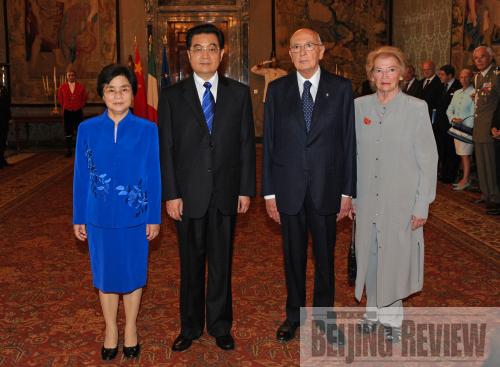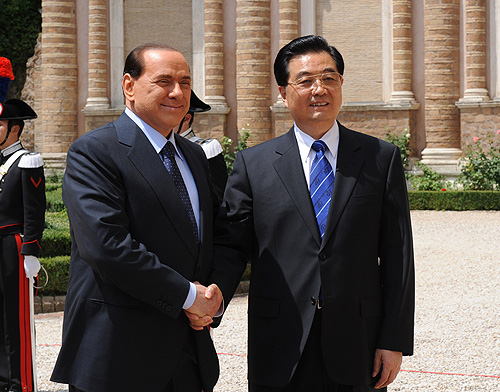|
 |
|
WELCOME: Italian President Giorgio Napolitano poses with Chinese President Hu Jintao at a welcoming ceremony at the Quirinal Palace in Rome on July 6 (FAN RUJUN) |
Before heading home from Italy ahead of schedule out of concerns over the situation in Xinjiang in northwest of the country, Chinese President Hu Jintao was able to finish his state visit to Italy, a visit that has been hailed as a big success.
Hu's visit to Italy was substantive and fruitful, said Chinese Foreign Minister Yang Jiechi, adding that it would contribute to upgrading the comprehensive strategic partnership between China and Italy.
 |
|
FRIENDLY TALKS: Chinese President Hu Jintao meets with Italian Prime Minister Silvio Berlusconi in Rome on July 6 (LI XUEREN) | During his visit from July 5 to July 8, Hu met with Italian President Giorgio Napolitano, Prime Minister Silvio Berlusconi and parliamentary leaders. He also addressed a business forum in Rome attended by more than 500 business leaders from China and Italy.
Minister Yang, who accompanied Hu on his visit, told reporters that leaders of the two countries agreed to strengthen high-level exchanges, enhance mutual political trust and broaden pragmatic cooperation.
They focused their discussions on trade and economic cooperation with a view to jointly coping with the international financial crisis, Yang said. In this regard, they reached an agreement on exploring new areas for cooperation, he added.
While Hu was in Italy, Chinese entrepreneurs in a trade and investment promotion delegation signed a number of agreements with their Italian peers in diverse areas such as trade and environmental protection. Yang said the delegation's visit demonstrated China's sincerity and positive attitude toward promoting bilateral trade and economic ties.
According to Chinese statistics, trade between China and Italy reached a record high of more than $38 billion in 2008, approaching the goal the two countries have set to raise bilateral trade volume to $40 billion by 2010. Italy is currently China's fifth biggest trade partner and third biggest technology exporter in the European Union.
Reviewing the 39-year history of China-Italy relations, Hu said the profound friendship between the Chinese and Italian nations and the absence of conflicts of fundamental interests or problems inherited from the past have put bilateral ties on a solid foundation.
China and Italy always understand each other, take each other's major concerns into consideration, shelve differences in their social systems and cultural traditions and treat each other equally with mutual respect and trust, he said.
Both countries look at and deal with their bilateral relations from a strategic and long-term perspective, he said. Their decision to establish a comprehensive strategic partnership in 2004 gave strong impetus to their all-round cooperation, he added.
Hu also noted that China and Italy share identical or similar v iews on many major international and regional issues and are committed to world peace and development.
Building the future
At a meeting with Berlusconi, Hu called on the two countries to take efforts to cope with the impact of the international financial crisis as an opportunity to deepen economic and trade cooperation. Relevant government departments should continue to support and facilitate trade relations between the two countries' enterprises, especially the financing of small and medium-sized enterprises. They should encourage strategic cooperation in the fields of telecommunications, infrastructure construction, the automobile industry and logistics. They should oppose trade and investment protectionism and resolve trade disputes through consultation and dialogue.
China and Italy should expand the areas of cooperation to promote the two countries' economic and social development, Hu said. They should work together more closely in energy conservation, reduction of greenhouse gas emissions and new energy as they summarize experience in their cooperation in science and technology and environmental protection. They can also look at the potential in the media and creative design industries, while strengthening collaboration in tourism, traditional Chinese medicine, disease prevention and control and disaster relief.
China will hold a "Chinese Culture Year" in Italy in 2010. Hu said the two countries should take this event as a new platform to strengthen people-to-people and cultural exchanges.
Hu had planned to attend the summit of the Group of Eight and major developing countries in central Italy's L'Aquila and pay a state visit to Portugal. However, the Chinese President cut short his European tour after riots broke out in Urumqi, the capital of Xinjiang Uygur Autonomous Region, on July 5.
State Councilor Dai Bingguo attended the summit in L'Aquila on Hu's behalf. His visit to Portugal will be rescheduled, Yang said.
Vis-à-Vis
A Chinese trade and investment promotion delegation visited Italy on July 5-6. The delegation, organized by China's Ministry of Commerce and comprising nearly 300 representatives from more than 200 Chinese companies, held talks with more than 500 Italian companies to seek business opportunities. The companies signed more than 30 contracts and intent agreements in the fields of advanced technology, machinery equipment, information and communications, automobiles, textiles and light industry.
ZTE Corporation and Huawei Technologies Co. Ltd. promoted their hi-tech products such as telecom and network equipment in Italy. A Beijing-based solar cell producer will sell its products to an Italian company.
Guangzhou Automobile Industry Group Co. Ltd., one of China's state-owned auto giants, signed an agreement with Fiat, one of the world's top 10 automakers, on jointly launching a $740 million passenger vehicle project.
The China Development Bank and Mediobanca SpA agreed to cooperate in providing loans for clean energy, infrastructure and telecom projects.
China's Ministry of Commerce signed three memorandums of understanding with the Ministry of Economic Development of Italy on investment facilitation, hi-tech cooperation, and establishing a work group on energy conservation and environmental protection.
The China Chamber of Commerce of Import and Export of Foodstuffs, Native Produce and Animal Byproducts and the China Chamber of Commerce for Motorcycles also reached agreements with their Italian counterparts.
After visiting Italy, the delegation headed for Sweden, Finland and Portugal.
(Source: The Ministry of Commerce of China)
| 